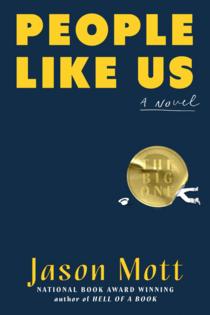Review: 'People Like Us' is one of the year's best novels
Published in Books News
The title of Jason Mott’s oddly riveting “People Like Us” refers to several groups: Black people (like its three narrators), Europeans, writers, Southerners, Americans, those who feel left out.
“I wonder what it feels like to be somewhere in this world and not feel like an outsider,” says a guy named Dylan in a poignant exchange late in the novel. Dylan is like all of the other characters in “People Like Us” — particularly the Black ones — who feel so alienated by the gun-loving, police-overreaching culture of America that they’re searching for somewhere else.
I rarely think to write about a book’s design, but it’s worth addressing because Patrice Sheridan’s work on “People Like Us” is so handsome, clever and useful. A cartoony cover image of someone who has lost his fedora while being flattened by one of those stickers they put on award-winning books represents one of two main narrators, who tells us he’s known for the “n-word,” his National Book Award (not incidentally, Mott won that prize for his last novel, “Hell of a Book”).
The author, nicknamed Johnny Wordcount, is on a book tour in Europe and each of his chapters opens with a silhouette of his face, wearing that fedora. The other main narrator is Soot, a character from “Hell of a Book,” who is grimly preparing a speech at an unnamed Minnesota university. His mission is to calm fears after a recent school shooting (we know the place is fictional because its official colors are the least likely combo for a major Minnesota university: green and gold).
You may have wondered about the adjective “oddly” before the word “riveting” in this review’s first paragraph. Usually, riveting would imply breakneck action or suspense, but not much happens in “People Like Us.” Wordcount has an assassin on his tail but the assassin, Remus, only appears once in a while and may be a figment of our narrator’s imagination, anyway.
What makes “People Like Us” riveting is the question we keep asking ourselves: What do these narrators have to do with each other? Their voices are dramatically different — Wordcount wisecracks like crazy whereas Soot, haunted by recent tragedies, is solemn. Still, it’s tempting to think they’re versions of the same man, especially since both have reluctantly purchased guns, are writers, are Black and seem to be stuck at a crossroads.
But other details don’t match. Neither do those silhouettes, which is where the third narrator I alluded to comes in, and where the design offers a little thrill of recognition. The final chapter is preceded by a silhouette that belongs to neither Wordcount nor Soot. But, if you’ve seen a few photos of Mott, you’ll realize it’s him. Eventually, Mott confirms that in a brief coda that helps connect everything we’ve read.
Satiric but also big-hearted, “People Like Us” is a hugely ambitious book. It takes big swings at topics many people like us are struggling to understand. It doesn’t always connect, but that barely matters in a work that insists we must keep trying to put together words that help each other make sense of the world.
One sign of Mott’s assurance is Soot’s speech. It’s a huge ask — Could any speech help, for instance, the Sandy Hook Elementary parents? — but Mott spends most of the book setting up Soot’s impossibly big moment of comfort and wisdom. And, when we get there, the writer and his character knock it out of the park.
____
People Like Us
By: Jason Mott.
Publisher: Dutton, 270 pages.
©2025 The Minnesota Star Tribune. Visit at startribune.com. Distributed by Tribune Content Agency, LLC.













Comments